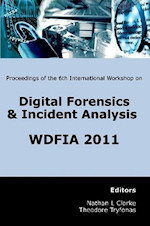In 2014, we launched our open-access repository which offers full text access to conference proceedings from many of our events including the INC and HAISA series. These papers are free to access and distribute (subject to citing the source).
» Openaccess proceedings » 6th International Workshop on Digital Forensics and Incident Analysis (WDFIA 2011)
 | 6th International Workshop on Digital Forensics and Incident Analysis (WDFIA 2011) |
Title: Requirements for wireless sensor networks in order to achieve digital forensic readiness
Author(s): Francois Mouton, Hein Venter
Reference: pp108-121
Keywords: forensic readiness, digital forensics, wireless sensor networks
Abstract: The field of wireless sensor networking is a new and upcoming one and unfortunately still lacking as far as digital forensics is concerned. All communications between different nodes (also known as motes) are sent out in a broadcast fashion. These broadcasts make it quite difficult to capture data packets forensically whilst retaining their integrity and authenticity. This paper examines the differences between IEEE 802.15.4 wireless sensor networks and IEEE 802.11x wireless networks when it comes to implementing digital forensic readiness within the network environment. It focuses on the differences in the communication protocol, proof of authenticity and integrity, time stamping, modification of the network after deployment and other differences between IEEE 802.15.4 wireless sensor networks and IEEE 802.11x wireless networks. Each of these elements is discussed, after which a table is provided that shows the specific requirements to be taken into account when proposing digital forensic readiness in a wireless sensor network environment.
Download count: 1807
How to get this paper:


PDF copy of this paper is free to download. You may distribute this copy providing you cite this page as the source.
